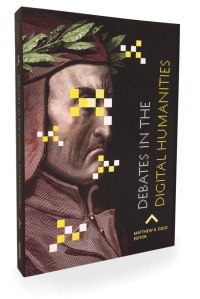After a snow day last week, we met for the first time yesterday and discussed two articles from the book Debates in the Digital Humanities.

The articles were “This Is Why We Fight”: Defining the Values of the Digital Humanities by Lisa Spiro, and Digital Humanities As/Is a Tactical Term by Matthew Kirschenbaum.
The two articles provide quite a contrast: Spiro’s is optimistic and all-embracing, and discusses the usefulness and larger possibilities provided by the process of articulating a values statement for the DH as a field; Kirschenbaum’s article is more pragmatic, and discusses the history of DH and how thinking tactically about the field’s uses, goals, and funding can be not only helpful for getting it implemented, but also for expanding and defining the field.
One criticism the group came up with was that while Spiro’s article does a good job of articulating goals, it is not very ‘digitally’ specific — almost all of her goals and values could be applied to the process of making academia in general, or humanities in general, a friendlier, more inclusive space. And while one attendee pointed out that this may be the goal of DH in the long term (to become the norm for humanities scholarship) in the present, it seems like a little more focus on the digital aspects of DH may be necessary. Kirschenbaum’s more pragmatic approach seemed to have made our readers slightly more comfortable with his points and his overview of the history of the field provided talking points for discussion about the development of the field.
The variety of viewpoints of our attendees, from those who are relatively new to DH to those who have a more library-centric or more academically-centered focus, made for an excellent discussion. We were only sorry not to see more people there!
We look forward to seeing you at our next meeting:
HTML Resume Workshop
Tuesday February 18th
LL 802 (Lincoln Center) 1:30pm
Learn how to use HTML to make your resume more striking online: in the process you will not only learn how to make your resume look better on sites such as WordPress or other blogging platforms, you will also learn the basics of HTML markup language, which has a wide variety of applications, and is the basis of a number of other markup languages used widely in the digital humanities.
